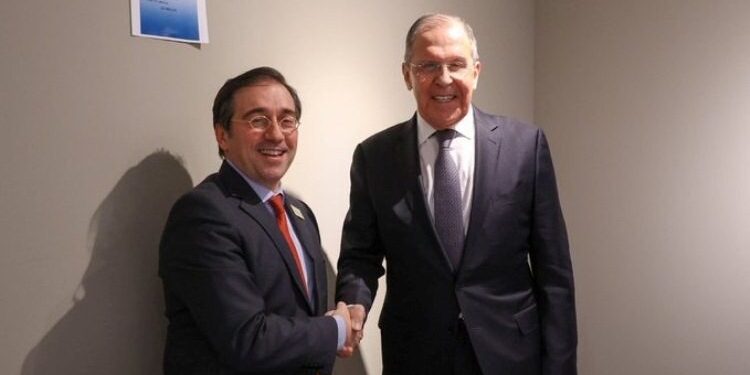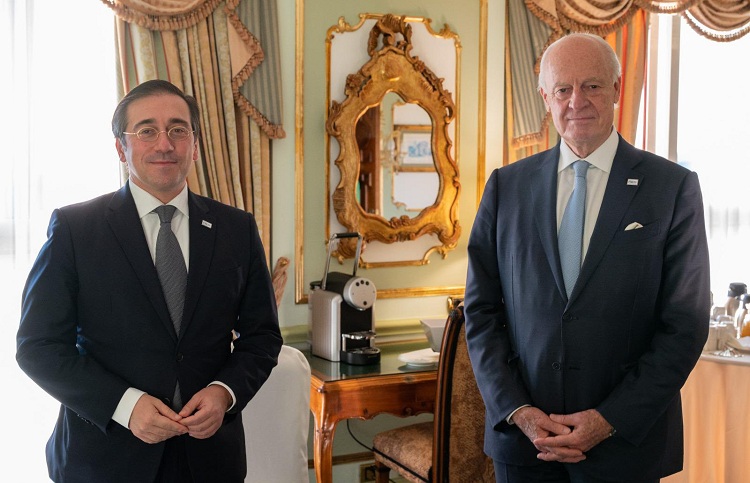Eduardo González
The Ukraine crisis, the use of migrants as a political weapon by Belarus and the Spanish military participation in the current NATO maneuvers in Latvia starred yesterday in the interview held in Stockholm between Foreign Minister José Manuel Albares and his counterpart from the Russian Federation, Sergey Lavrov.
“It is the first time I have met with him and we have been able to exchange on our bilateral relationship,” Albares told journalists at the end of the first day of the Ministerial Council meeting of the Organization for Security and Cooperation in Europe (OSCE), which is being held in the Swedish capital.
During the meeting, he continued, both ministers spoke “at length” about “the importance of our energy relationship”, since “between 8 and 10% of the gas consumed in Spain comes from Russia”. Russia did not export a single barrel to Spain last September following the Spanish government’s decision to reduce its purchases of Russian gas in the midst of rising diplomatic tensions between Vladimir Putin’s government and the European Union over natural gas supplies and the migration crisis on the Polish-Belarusian border.
“At the same time,” Albares continued, “I have made clear Spain’s positions on territorial integrity and sovereignty in Ukraine” and on “the unacceptability of using irregular migration as a political weapon on the borders of Belarus.” “We have also analyzed the situation in the Sahel, in Mali and Libya, where Russia is present,” he concluded.
For their part, the Russian Foreign Ministry reported on its website, the two ministers discussed “prospects for Russian-Spanish cooperation in various fields” and the readiness of both governments “to continue implementing important bilateral projects in the commercial, economic, cultural and humanitarian spheres.”
With regard to the “regional crises”, Lavrov described as “counterproductive” the approach of NATO military infrastructure to the Russian borders, “including the participation of individual military units of the Spanish Armed Forces in the Alliance exercises held near the Russian borders”. Several troops of the Spanish Army have been participating in the NATO military exercise Winter Shield 2021 (Winter Shield 2021) in Latvia since November 22 and until December 4. The maneuvers are being carried out around the Adazi base, where the Alliance has deployed the operation Enhanced Forward Presence as a deterrence instrument against Russia. Spain has a contingent of 350 troops at this base, whom Albares visited last Tuesday to convey to them “Spain’s pride in their mission”.
Likewise, according to Moscow, Lavrov asked Albares to analyze “objectively” the crisis generated by the influx of migrants on the Belarusian border with Poland and Lithuania. According to the head of Russian diplomacy, the EU should refrain from using “double standards” and blaming Minsk for what is happening. During his aforementioned visit to Latvia to participate in the meeting of NATO Foreign Affairs ministers, Albares defended the “deterrent dialogue” with Russia to warn Moscow of what would happen in case of threatening Ukraine, because “it is always better to try to desist through dialogue than through real military action”, and denounced the “unacceptable” use of “irregular migration as a weapon, using human beings as if they were bullets”.
Apart from with Lavrov, Albares also met yesterday on the margins of the Ministerial Council with OSCE Secretary General Helga Schmid; and with his counterparts from Norway, Anniken Huitfeldt, and Serbia, Nikola Selaković.







